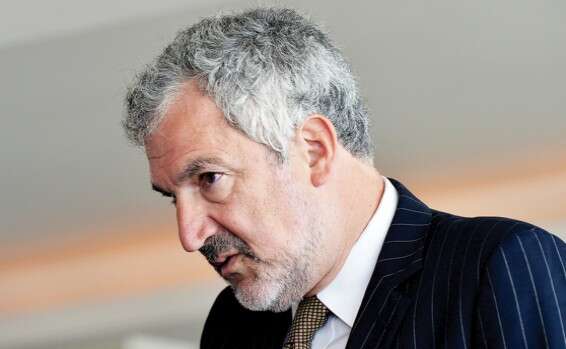"The idea that painful concessions and mediation, satisfying the losers, will end the war is preposterous. That is not how wars end," says historian and Middle East scholar Daniel Pipes, president of the Middle East Forum think tank.
Pipes believes that Israel's approach to ending the long conflict with the Palestinians is fundamentally wrong. Not only that, he believes that Israel's repeated attempts to appease the Palestinians will necessarily lead to failure, not peace.
"Wars end when one side gives up. That makes sense. One wins, one loses, or mutual exhaustion, but in general, it is one side wins. That is how wars end," he says.
Recently, Pipes has been working on a new initiative, the Israel Victory Project, in an effort to drum up support for his approach. His plan of action has raised some interest both in the U.S. Congress and in the Israeli Knesset. Pipes' approach contends that in the past, the Zionists focused on defeating their adversaries, a strategy that proved successful in the face of Arab enemies.
But now, for whatever electoral and diplomatic reasons, Israel has opted for a tactical approach rather than a strategic one to ensure calm, he says.
The Israeli military is "like a police force, not a military," he says, adding that as welcome and necessary as calm may be, it actually only perpetuates the conflict.
"Their goal is protection of Israeli lives, which is what police do, but there needs to be an approach like a military. To convince the enemy that it lost, which is not the approach of Israel today," he says.
Pipes cites Israel's removal of metal detectors from the Temple Mount over fears of igniting tensions. The metal detectors were installed after Israeli Arab terrorists attacked and killed two guards there in July 2017, only to be dismantled a week later due to Muslim protests.
"With a cowboy in the White House, with the Palestinian leadership stymied making mistakes left and right, now is a great time to try to conclude this," he says.
Q: In effect you are saying that we need to make them understand, as then-IDF Chief of Staff Moshe Ya'alon said during the Second Intifada?
"He said the Palestinians need to understand that this [violence] is useless, but I am saying that the Palestinian will has to be broken."
Q: Are you saying they need to be re-educated?
"I am not looking at schools. I am looking at the consensus, which I estimate to be 80% of the Palestinians who believe they can win this war. There are 20% who say, 'Let's live side by side with the Zionist entity.' That number has been static. If not for that 20% selling arms and land to the Zionists, there would be no Israel.
"Today their importance is not that great, but it is still important. So there is a kernel, a base of Palestinian acceptance of Israel. My goal is to get more from the 80% to join the 20%. To convince more and more Palestinians, not through education, although that would be nice, that they lost this war, that it is over.
"There are three reasons why the Palestinians persist in this delusion that they can defeat Israel. The first is Islamic ideology that holds that any territory that been under Muslim rule will revert to Muslim rule. The second is international support. All those U.N. declarations, all those Muslim states, all those leftists make them believe it. The third is the defensive nature of the Israeli approach. Israel puts a premium on quiet. No intifada, no collapse of the Palestinian Authority, no trouble. So the Israeli security agency, the Border Police, intelligence agencies as a whole just want to keep things quiet."
Q: What are the measures of success that would indicate that the Palestinians understand that they have lost?
"When the Jews of Hebron have no more need for security than the Arabs in Nazareth. When the Palestinians express their unhappiness with harshly worded letters to the editor. When the violence is over, but not just. When the whole campaign of delegitimization is over. When the effort to eliminate Israel as a Jewish state has come to an end. When there is a change of heart.
"It is not just a matter of signing a piece of paper. It needs to be a fundamental change, and that has not been Israel's goal with the Palestinians. It worked with the Arab states. Broadly speaking, the Arab states realized by 1977 that they couldn't defeat Israel in a military effort."
Q: What about U.S. President Donald Trump's support for Israel and his decision to relocate the U.S. Embassy to Jerusalem?
"In general, I am suspicious of American gifts to Israel. I generally like a low-grade tension between the U.S. and Israel because then Israel doesn't make silly mistakes to get presents from Washington. I do think we will have a price to pay, the Israelis got what they want, now it is the Palestinians' turn."
A failed reform
Pipes is well known among Middle East researchers as having accurately predicted processes in the Muslim world ahead of the Sept. 11, 2001 attacks. He even warned in the 1990s that al-Qaida was not just another radical organization that attacked Western targets from time to time, but was part of the war being waged by radical Islam against Western civilization, and that this war was making its way toward the United States under everyone's noses. Not only that, he also specifically warned that al-Qaida was training in techniques designed to topple tall buildings.
In his view, the greatest change since the 1990s is the attention that the U.S. now pays to regional processes and to subtleties and undercurrents in the Arab street, in stark contrast to its reckless blindness prior to Sept. 11, 2001. The result is clear: American military involvement in the region is unprecedented in terms of length.
"As a result of two major developments that occurred in a close timeframe – the 2001 attacks and then March 2003 [the Iraq war] - Westerners in general and Americans in particular became focused on the Middle East in a way that they had never been before. The Middle East is full of incitement, volatility, war and so forth, but never before had there been an attack on our homeland in this way, and never before had there been an American-led war in the Middle East that lasted so long. No other region or topic receives as much attention as the Middle East and Islam. As a result, there is more discussion and more understanding than there was 20 years ago."
Q: Would you say that Arab oil isn't as powerful as it used to be? That the view of the region has changed?
"Well, there are larger forces at work than that. Particularly Saudi Arabia, but also the United Arab Emirates. They have shifted their focus because of the Iranian threat, and they are no longer focused on Israel. Therefore, their clients, the oil companies, are likewise no longer focused on Israel. So, for decades if you said 'the Middle East conflict,' people understood it to mean the Arab-Israeli conflict, but now it is understood to be Iran-Saudi Arabia. It was a long time coming. It was slow, but it has happened. Israel is now an auxiliary member of this Saudi bloc."
Asked whether he thinks Israel is profiting from the situation, as it did during the Iran-Iraq war, Pipes warns that the shift in Saudi Arabia is not to be confused with an ideological shift.
"I wouldn't say the Sunnis are on Israel's side. There is an alliance of convenience from the Saudi point of view. I would imagine that when the Iranian threat goes away, so will the alliance of convenience. It is not profound.
"Still, I think there are opportunities for Israel to be helpful to the Sunni bloc that could have positive long-term benefits. It is also in Israel's interest to ensure the success of Saudi Crown Prince Mohammed bin Salman in his modernizing efforts. Modernization is a huge undertaking, but it will benefit Israel if it succeeds."
Q: So why not, for the time being, support the Iran nuclear agreement?
"Because it gives the Iranians a legitimate path to a nuclear weapon. And that, to many of us, is a horrific development, given the apocalyptic nature of the Iranian regime and its aggression. Why would we offer that, why would we postpone the inevitable? Today they behave themselves somewhat, but 10 years from now they have the freedom to do whatever they want?"
According to Pipes, the crippling sanctions imposed on Iran before the 2015 nuclear agreement were also ineffective. He argues that only a military strike to destroy Iran's nuclear facilities will do the job.
"I don't believe in general sanctions, because they ultimately fail, as they did in North Korea. There the regime continued to develop the nuclear program even while the citizens were dying of hunger. These sanctions may make things difficult for the regime, but ultimately, the regime gets what it wants. The only way to stop the Iranians is to do what Israel did in 1981 and again in 2007: Bomb and destroy the nuclear reactors.
"You can't do that much because so much of it is way underground, you can only delay it, but if you attack it once, you have to be committed to attacking it again. It is not in cities, it is remote, it can be done. I don't want to overthrow the regime, I do want to break their nuclear infrastructure. it is the only way to stop it."
Q: The nuclear agreement prompted a popular uprising in Iran. Do you see that as a sign of hope?
"While I am vociferously against the deal, there are two silver linings and you've touched on both. The first was that it woke up the Saudis and Emiratis and others to the danger. The second was that it created expectations, particularly in Iran, which were not fulfilled. In part because the money was sent to Lebanon and Syria and Yemen and Iraq, and in part because of Iran's very poor economic management."
Q: Is that what former President Barack Obama and others hoped would happen? That the deal would be a political means of leveraging the liberty and values of the West?
"Obama and [then-Secretary of State John] Kerry had the goal of bringing Iran in from the cold. It was not a bad goal but they didn't execute it well. Their goal was to make Iran friendlier, which hasn't happened – Iran is as unfriendly as ever, if not more."




